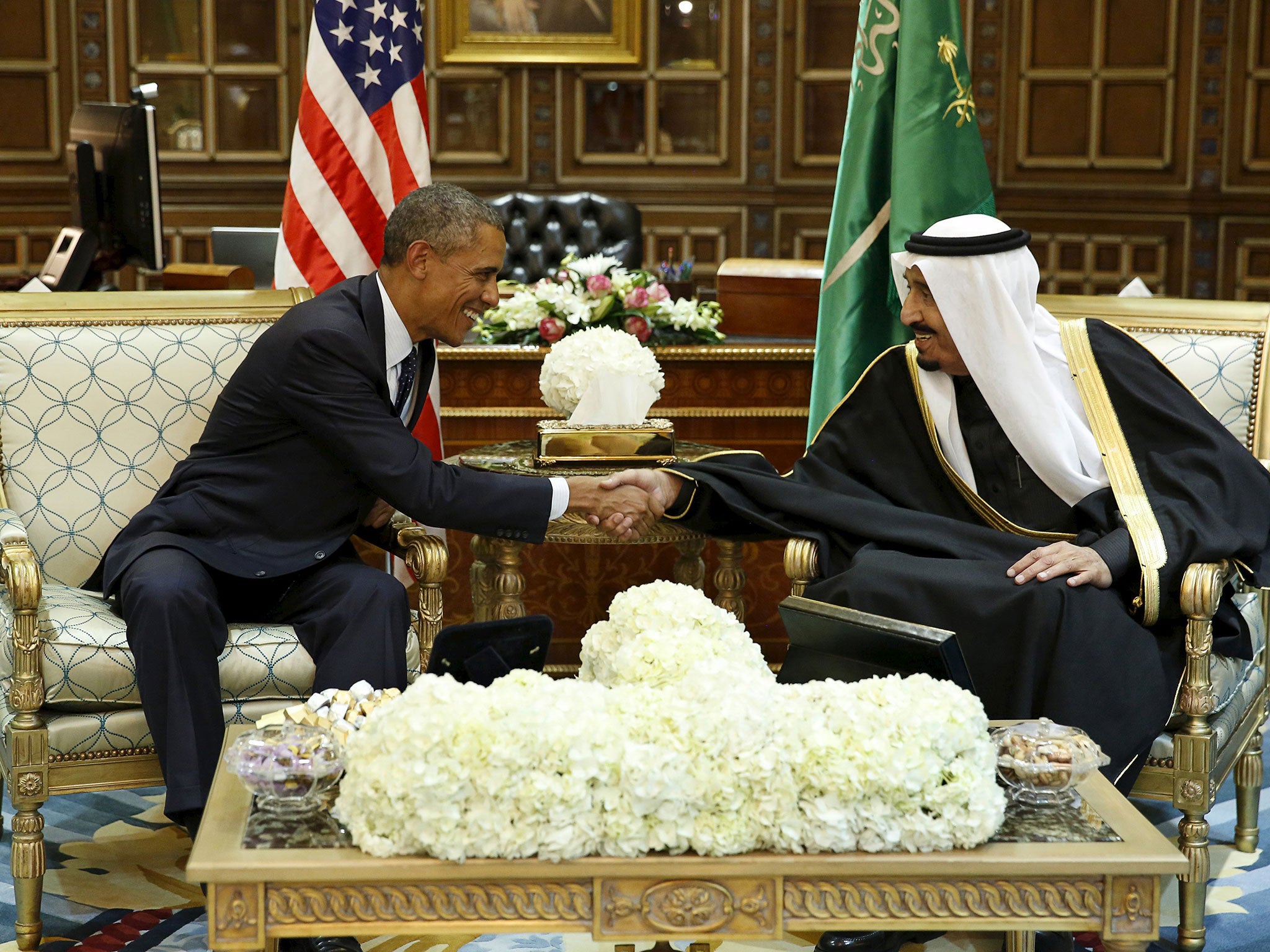Five issues likely to affect the relationship between the US and Saudi Arabia as Obama visits the Middle East
The US President is attending a security summit in the Arab state

President Obama arrives in Saudi Arabia on Wednesday to attend a security summit amid rising tensions with the wealthy sheikdom.
White House spokesman Josh Earnest said Saudi Arabia is an important partner in U.S. efforts to resolve the Syrian conflict and counter Islamic State militants, al-Qaeda in Yemen and Iran’s bad behavior in the region.
Here are five issues that cause friction between the United States and Saudi Arabia:
The 9/11 terror attacks
The White House on Tuesday all but threatened to veto a bill in Congress that would allow a lawsuit to proceed against the Saudi government for any role it may have played in Sept. 11, 2001, terror attacks.
Obama has said such a lawsuit would open the door to a multitude of lawsuits against U.S. officials and members of the military working abroad.
Family members of 9/11 victims in a letter Tuesday blasted Obama for his stance. “It is not acceptable … to succumb to the demands of a foreign government that we abandon principles of American justice,” the letter said, according to the Associated Press.
Saudi Arabia threatened to sell up to $750 billion worth of U.S. assets if Congress passes the bill. Such a move would jeopardize “the stability of the global financial system,” Earnest has said.The official 9/11 Commission concluded that senior Saudi officials did not knowingly support the plotters, and since then, "we have seen the Saudi government focus more intently on combating and countering those who propagated extremist ideology,” he said.
Complicating the matter is a new push to declassify 28 pages of the 9/11 report in 2002 by the Senate and House intelligence committees that have not been made public and allegedly support the main theme of the lawsuit.
The papers describe the role of Saudi wealth in the spread of radical clerics who preached the ideology of al-Qaeda. Current and former members of Congress are calling for the pages to be declassified and released.
Syrian cease-fire and peace talks near collapse
Indirect peace talks in Geneva between the Russian-backed Syrian government and the U.S.- and Saudi-backed Syrian opposition teetered on the brink of collapse Tuesday, along with a partial cease-fire on the ground.
Secretary of State John Kerry said when the cease-fire was announced in February that it would create an opportunity to negotiate a political transition for Syria. If it failed, Kerry said the U.S. would consider a “Plan B” for Syria and warned “this could get a lot uglier.”
Now that seems to be happening, the Saudis are likely to press Obama to provide more support for the Syrian rebels. But Obama will likely be more interested in talking about Saudi assistance to fight the Islamic State in Iraq and Syria.
Yemen civil war
Talks on ending the Yemen civil war set to take place Monday failed to happen. The Iran-backed Houthi rebels refused to attend, citing heavy fighting and Saudi-led airstrikes.
The fighting has caused 6,400 deaths and forced some 2.8 million people from their homes, according to the United Nations.
Saudi Arabia seeks to prevent Yemen, on its southern border, from becoming a base for Iran, which it accuses of supplying arms to the Houthis. Rob Malley, who coordinates White House policy on the Middle East, said: “The fight in Yemen has distracted from the crucial fight against (Islamic State) and against al-Qaeda,” which are both active in Yemen.
In pictures: Protests around the world over Saudi executions
Show all 7Resurgent Iran
Saudi Arabia views Iran as a long-time enemy and a rival for influence in the region. The two nations support opposite sides in Syria, Yemen and Iraq.
Obama has welcomed the recently lifted nuclear sanctions against Iran, saying economic development and increased interaction with the West creates opportunities for working on shared goals. Arab Gulf states, however, worry that Iran's ongoing missile tests are a sign it has not abandoned its nuclear weapon ambitions.
Despite U.S. assurances to the contrary, the Saudis and other Persian Gulf monarchies worry that Iran is becoming more assertive with U.S. approval.
In Riyadh, Obama and the Gulf state leaders will have a separate session just on Iran. “I don't think that there can be any confusion or ambiguity about who is our partner in the region and who isn’t,” Malley said.
Low oil prices
Saudi Arabia’s economy is hurting from low prices on its main export, as talks with oil-producing countries to limit production ended Sunday without an agreement.
The Saudis refused to cut production so long as Iran did not agree to limit its own growth. The U.S., whose fracking boom also contributed to the global oil glut, is not party to the talks.
Low oil prices caused the U.S. oil sector to cut 250,000 jobs in the past two years, but the White House says it’s not concerned. Earnest said Monday that a conversation about the impact of low oil prices on the U.S. economy is preferable to a conversation on the alternative.
Contributing: Gregory Korte; Copyright: USA Today
Subscribe to Independent Premium to bookmark this article
Want to bookmark your favourite articles and stories to read or reference later? Start your Independent Premium subscription today.

Join our commenting forum
Join thought-provoking conversations, follow other Independent readers and see their replies